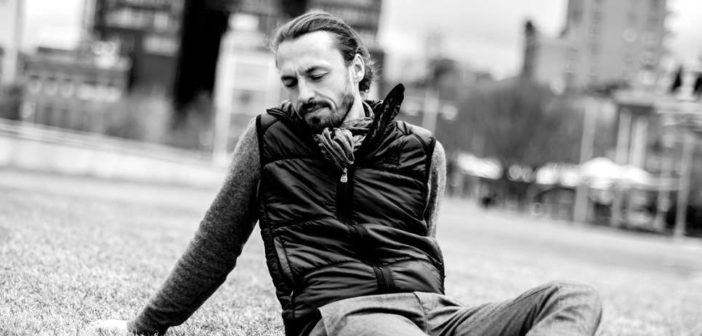Markus Sieber is a world musician, located in Colorado but originating from Germany. For a boy who grew up east of the communist-controlled border in a divided country during a significant period of unrest in his nation’s history, the colour of experience and perceptions of life are difficult for those not from there to comprehend.
Having lived his adolescent years prior to the Berlin Wall collapse, his observations on life contain a myriad political and social statements. He says that he listened to Pink Floyd records that his parents came to own via the black market established to import less sanitized music than mainstream modern acts like The Beatles, and most likely these records informed his decision to start an emo-punk outfit at age 15, when he began writing songs from his own point of view.
Sieber saw firsthand the Berlin Wall fall in 1989 and he recalls that confusion reigned for a period of two or three years afterwards, when a sense of anarchy prevailed in East Germany and he found himself an unlikely squatter in palatial homes no longer occupied by people who had fled the East in hope of a better life in the West.
“We had changed the system, but Coca Cola took over and people just wanted to go for [commercialisation],” he says of the era. “Then there was this other form of ‘no we don’t want to have this, we are eager to just express who we are’ – it was pretty loud and emotional.”
Each of these episodes, historic in their own right, are indelibly imprinted on his memory and now, over 25 years on, he’s found the means to apply these and other earlier recollections to his current music project, Aukai, his creative pseudonym.
“It’s inspired by travelling and places, but also memories that involve recollections from childhood, and yet it leaves room for [the responses of]everyone who listens to it, rather than putting my own interpretation on it,” he says mindfully. “It’s more like building atmospheres where you can go and make your own story from the music.”
The record is a masterful tapestry of meandering minimalism, brought to life through the emotional connections the formally untrained musician has evolved. The strong influence of a carefully interwoven, delicately plucked string instrument, the ronrocco, in these arrangements transports listeners inward, encouraging individuals to explore their own personal nostalgia.
“Aukai, it’s going a little bit backwards and back to my roots, but from a musical aspect I wanted to write little pieces that were ambient soundscapes and cinematic pieces which kind of bring the listener into the inner space, that could fit in film and dance and theatre, and at the same time could work just listening to it,” Sieber says.
It’s no accident that these soundscapes lend themselves to use as stage, small-screen and cinematic scores. Sieber cites influences such as film composers including Gustavo Santaolalla (Babel, Brokeback Mountain) and Johan Johnson (Morran and Tobias, Next Door Letters) and applies knowledge gained from his years studying film and theatre in Germany.
The album is representative of collaboration, not merely involving different instruments but musicians’ personal contributions too. A slew of talented, largely European musicians and sound engineers have lent their own nuanced memories to this timeless record, it feels. Most notably, Sieber drew on his German contacts, including his friend, producer Nils Frahm, who introduced him to the renowned German producer Martyn Heyne.
Heyne was happy to offer his production masterminding skills and Lichte studio facilities in Berlin to work with Sieber, and his musical annotations glisten among the impressive stable of session artists also involved. These include NYC-based Laurie Anderson-collaborator Jamshied Sharifi on vintage keys throughout and talented cellist Anne Müller (Agnes Obel Band, Nils Frahm); the meeting of the two forging the organic emotional connection that Sieber values highly.
“When I work with a musician I feel it’s much more interesting to have a dialogue than it just be my thing,” he muses. “Maybe this other musician opens the door.” Recounting his first meeting with Müller, Seiber remembers relying heavily on the instant connection struck between them.
“So Anne came to the studio and it was an incredible connection from the first moment,” he says. “She played literally just one note in the whole soundtrack to Victoria [composed by Nils Frahm]and how she plays that, I really wanted to try and work with her because she is somebody who brings sophistication and incredible minimalism.
“As I’m not a trained musician, I can’t write down the score, I rely on the emotional connection, I can transmit it with my words with my hands, but I kind of want to get it out, and with Anne it was just like, wow!”
One thing is for certain the pervasive organic-nature of the record is assured. From the field recordings conducted in Mexico by Sieber, the instrumentation in its pure and most distilled state, the manner in which collaborations with musicians came about and the nostalgia injections flowing through, Aukai continues to allow Sieber to make statement of political and social observation, only this time on his current lifestyle.
You can find Aukai here.




